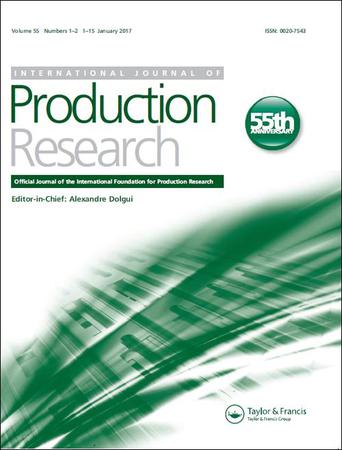Estimation-based production control of manufacturing–remanufacturing systems with uncertain seasonal return and imprecise demand and inventory
IF 7
2区 工程技术
Q1 ENGINEERING, INDUSTRIAL
International Journal of Production Research
Pub Date : 2023-10-18
DOI:10.1080/00207543.2023.2269275
引用次数: 0
Abstract
AbstractHybrid manufacturing systems utilising raw materials and returned end-of-life products for production are studied. The systems are failure-prone and subject to inventory, market demand and return uncertainties. Thanks to growing environmental and sustainability concerns, the manufacturing sector is currently experiencing a significant growth in the popularity of reverse logistics. However, the practical implementation of production control in such systems is challenging due to return flow uncertainty and variability. To address this challenge, an estimation-based control using the Kalman filter is proposed in this research. The demand and return models employed contain random and deterministic components, with the latter being time-invariant for demand and uncertain with seasonal variations for return. The processing steps used include the estimation of inventory levels and demand and return components, return forecasting allowing cost computation over a long horizon, and the determination of the production and disposal policies adapting to market variations and uncertainties. We classify the systems according to relationships between their production capacity, demand and return ranges. We then present an extensive numerical study of optimal policies for various system classes and show that adaptive policies outperform the conventional ones, thus proving the effectiveness of the proposed production control approach for complex industrially oriented systems.Keywords: Remanufacturingfailure-proneuncertaintyestimationforecastingKalman filter Disclosure statementNo potential conflict of interest was reported by the author(s).Data availability statementThe data supporting the findings of this study are available from the corresponding author, V. Polotski, upon reasonable request.Additional informationNotes on contributorsVladmir PolotskiVladimir Polotski is a researcher in the Mechanical Engineering Department at Ecole de Technologie Superieure (ETS). Hi graduated from Moscow State University in 1974 and obtained his Ph.D. in Mechanics and Control in 1978. After moving to Canada in 1993, he joined the Perception and Robotics Group at Ecole Polytechnique de Montreal where he worked as a researcher from 1994 to 2004. From 2005 to 2009 he was a Chief algorithm designer in Frontline Robotics Inc. working on autonomous robotic systems for security applications. From 2010 to 2012 he played a key role in the design and development of navigation systems for two planetary rover projects launched by CSA working for Cohort Systems Inc. and Neptec Design Group. Since 2012, he works as a researcher in the Department of Mechanical Engineering at ETS. His research interests focus o stochastic control of manufacturing systems and mathematical problems in product development. Dr. Polotski has more than 40 years of experience in automatic control, signal processing, sensor fusion, optimisation, mobile robotics and numerical modelling.Jean-Pierre KennéJean-Pierre Kenné is a Professor in the Mechanical Engineering Department at Ecole de Technologie Superieure, University of Quebec since 2000. He received his M.S.A and Ph.D. in Mechanical Engineering both from Ecole Polytechnique de Montreal in 1990 and 1997, respectively. He was project manager in automation and control at GEBO Canada and Logitrol Inc. in 1998 and 1999, respectively, before joining Ecole de Technologie Supérieure. Professor Kenne's teaching activities include control of dynamic systems, optimisation and stochastic control, design and control of hydraulic systems. He has been working on the modelling of dynamic systems and the development of control policies for more than twenty years. He proposed different strategies for controlling and real time validation of such systems. Over the past three decades, Professor Kenné and his colleagues have developed expertise in integrating the basic concepts of optimal stochastic control theory with simulation-based optimisation models, experimental designs and response surface methodology.Ali GharbiAli Gharbi is a full professor in the Systems Engineering Department at the École de Technologies Supérieure (ÉTS). He is director of the Production System Design and Control Laboratory (C2SP), a member of the Interuniversity Research Centre on Enterprise Networks, Logistics and le Transportation (CIRRELT) and is funded by NSERC. His research interests focus on the production planning and control of manufacturing and remanufacturing systems operating in dynamic and stochastic environments, and their supply chains. Over the past three decades, Professor Gharbi and his team have developed a methodology, based on the integration of the basic concepts of optimal stochastic control theory with simulation-based optimisation models, such as experimental designs and response surface methodology. This methodology has made it possible to solve many of the complex problems considered while minimising both costs and other criteria such as environmental impact and product perishability.季节性收益不确定、需求和库存不精确的制造-再制造系统的估计生产控制
这种方法可以解决许多复杂的问题,同时最大限度地降低成本和其他标准,如环境影响和产品易腐性。
本文章由计算机程序翻译,如有差异,请以英文原文为准。
求助全文
约1分钟内获得全文
求助全文
来源期刊

International Journal of Production Research
管理科学-工程:工业
CiteScore
19.20
自引率
14.10%
发文量
318
审稿时长
6.3 months
期刊介绍:
The International Journal of Production Research (IJPR), published since 1961, is a well-established, highly successful and leading journal reporting manufacturing, production and operations management research.
IJPR is published 24 times a year and includes papers on innovation management, design of products, manufacturing processes, production and logistics systems. Production economics, the essential behaviour of production resources and systems as well as the complex decision problems that arise in design, management and control of production and logistics systems are considered.
IJPR is a journal for researchers and professors in mechanical engineering, industrial and systems engineering, operations research and management science, and business. It is also an informative reference for industrial managers looking to improve the efficiency and effectiveness of their production systems.
 求助内容:
求助内容: 应助结果提醒方式:
应助结果提醒方式:


